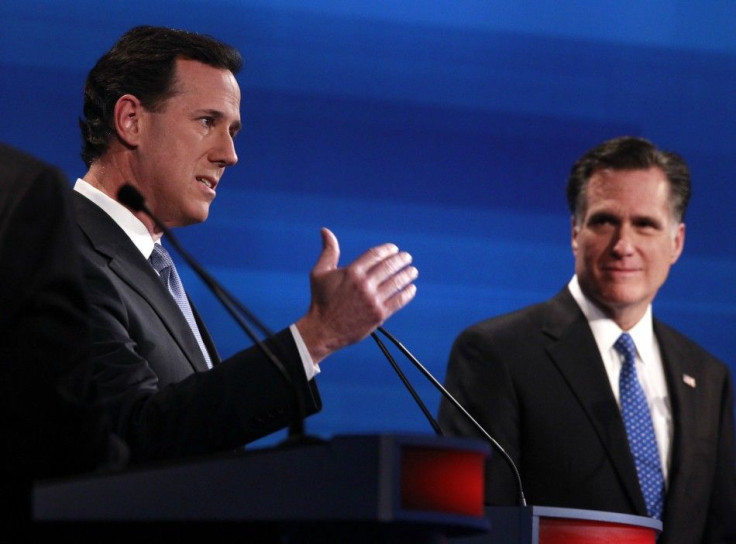Mitt Romney And Rick Santorum Both Score Wins On A Super Saturday

Both Mitt Romney and Rick Santorum claimed victories in Republican Party presidential-nomination contests conducted Saturday, as the former won the caucuses in Wyoming, Guam, the Northern Mariana Islands, and the U.S. Virgin Islands, while the latter won the caucuses in Kansas.
With 100 percent of the precincts in Kansas reporting on Saturday night, Santorum, the former U.S. senator from Pennsylvania, had 51.2 percent of the vote, according to Politico, which cited figures compiled by The Associated Press. He was followed by Romney, the former governor of Massachusetts, with 20.9 percent; Newt Gingrich, the former speaker of the U.S. House of Representatives from Georgia, with 14.4 percent; and Ron Paul, the U.S. representative from Texas, with 12.6 percent.
Santorum took 33 of the 40 Kansas delegates at stake, while Romney took seven, Reuters reported.
With 100 percent of the precincts in Wyoming reporting on Saturday night, Politico cited numbers compiled by AP in anointing Romney as the winner of the state's caucuses with 44.1 percent of the vote. He was followed by Santorum with 27.5 percent, Paul with 12.2 percent, and Gingrich with 0.5 percent.
Romney took seven of the 12 Wyoming delegates at stake, Santorum took three, and Paul took one, while one is uncommitted, AP reported.
Nine delegates apiece were at stake in Guam, the Northern Mariana Islands, and the U.S. Virgin Islands. In the former two territories, Romney won all of the delegates, The Wall Street Journal reported. In the latter territory, Romney took seven of them and Paul took one, while one is uncommitted, AP reported.
In terms of delegates to the Republican National Convention in August awarded during the day, it thus appears Romney finished first with 39, Santorum placed second with 36, and Paul took third with two, while two are uncommitted.
Before the caucuses were held, Santorum hoped for a big win in Kansas, especially among the state's evangelical Christian and Tea Party voters, as previously noted in the International Business Times. He was on the stump in Topeka and Wichita on Friday as his campaign has been focusing on becoming the sole alternative candidate to Romney, who currently leads in terms of delegates and state wins.
We have an opportunity to potentially narrow this race down so we can go one-on-one with Gov. Romney, and once that happens, the conservative will be nominated, Santorum told a crowd of about 250 at a Topeka railroad station on Friday, according to The Kansas City (Mo.) Star.
Romney himself skipped campaigning in Kansas, although he was backed by the state's Bob Dole, the former U.S. Senate majority leader and Republican Party nominee in the 1996 presidential election. Romney headed straight for the South this week ahead of the critical Alabama and Mississippi contests on Tuesday.
Gingrich also headed to Alabama and Mississippi, but he didn't entirely neglect Kansas: He spent $180,000 on television ads in Kansas, the New York Daily News reported.
Meanwhile, the Kansas caucus results were disappointing for Paul. He has yet to win a presidential-nomination contest, and he spent much of Friday in the state, speaking at a rally in Topeka and stopping by Wichita and Lawrence, WIBW.com reported.
© Copyright IBTimes 2024. All rights reserved.






















